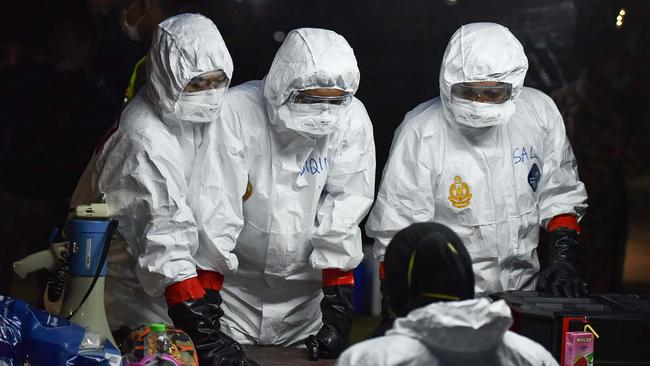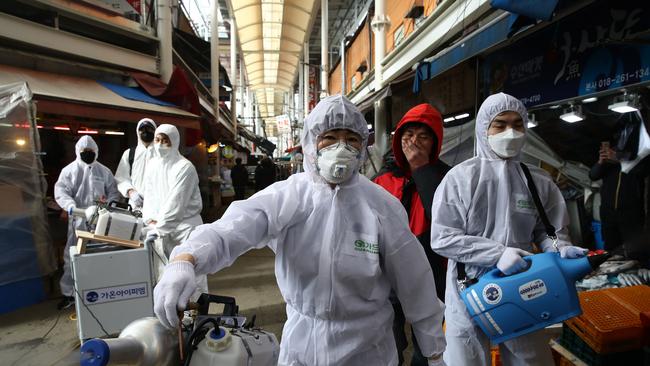Australia won’t have enough hospital beds if the coronavirus outbreak becomes severe
Australia’s hospitals would be severely stretched and beds may be rationed if the coronavirus becomes widespread, an infectious diseases expert has warned.

Illness
Don't miss out on the headlines from Illness. Followed categories will be added to My News.
- Aussie water polo team returns home after Italy warning
- Aussie scientist helps coronavirus breakthrough
Australia does not have enough ICU beds to deal with a major outbreak of coronavirus and if the virus becomes widespread access to hospital beds would be rationed.
An infectious diseases expert has estimated nearly 650,000 people would need an ICU bed in a year if the disease takes off here.
The Department of Health has told News Corp we have only 2200 such beds in public and private hospitals.
Hospitals are already under major pressure from our ageing population with bed block in Emergency Departments and record wait times for elective surgery.
The Federal Government’s own pandemic plan says in a high level outbreak of the virus access to hospital beds would have to be rationed.
“Heavy prioritisation will be essential within hospitals to maintain essential services,” the plan says.

Professor Raina Macintyre, Head of the Biosecurity Program at the Kirby Institute at the University of NSW, said sustained transmission in Australia may result in anywhere from 25-70 per cent of the population getting infected.
If 50 per cent of Australians became infected that is over 2 million people needing a hospital bed and over 650,000 people needing an ICU bed over a year, she said.
These calculations are based on World Health Organisation’s data showing 14 per cent of coronavirus patients have severe disease including pneumonia, 5 per cent have critical disease including respiratory failure, septic shock and multi-organ failure, and 2 per cent of cases are fatal.
“In China, we know that in addition to the people who died, 5 per cent needed to be in ICU and 14 per cent needed a hospital bed,” Professor MacIntyre said.
In Sydney, we estimate there are about 16,000 public hospital beds and 6000 private hospital beds.
“We have previously modelled the number of daily beds required in an epidemic scenario for a different infection, which shows that capacity for beds could be rapidly exhausted in a severe epidemic,” she said.
Coronavirus has now spread to 30 countries but the World Health Organisation has not yet declared it a pandemic because it is not spreading in an uncontained way.
However Australian National University infectious diseases expert Professor Peter Collignon said there was more than an 80 per cent chance it would become a pandemic.
“If we have any hope of containing it we’ve got to contain it now,” he said.
Even if it did become a pandemic he did not think it would get to the stage where 50 per cent of the population would be infected.
The deadly Spanish flu pandemic of 1918 only infected around 25-30 per cent of the population, he said.
In the event of a widespread outbreak admission to scarce hospital beds would have to be triaged, Professor Macintyre said.
“We have a triage system of red, orange, green for events like a volcano erupting or a bombing,” she said.
“You assess everyone and people who you look at and decide you can’t save, they get lower priority and you move on to people you can save,” she said.
To date it is mostly the elderly and those with other health conditions who have died from coronavirus but Professor Macintyre said no triage system would be ageist.
“We wouldn’t do anything that is ageist,” she said.

Health authorities would have to work around the fact there were not enough hospital beds by treating some people in their homes, she said.
The Department of Health said one option would be to set up fever clinics that dealt only with people suffering from coronavirus.
The government’s Emergency Response Plan for Novel Coronavirus says hospital staff to patient ratios could be changed to deal with staff shortages during a major outbreak.
Elective surgery procedures would be cancelled to free up beds for coronavirus patients.
Private hospitals would also be asked to reschedule their businesses and take on coronavirus patients.
MORE NEWS
400,000 dead: nightmare virus scenario
Japan urges Australia against travel ban
Don’t cancel Tokyo Olympics — it’s the gender equality games
The Emergency Response plan warns if a worst-case scenario sees widespread transmission of the coronavirus hospital and mortuary services will be under pressure.
The plan reads:“The demand for specialist equipment and personnel is likely to challenge capacity”.
Healthcare staff may get sick or have to care for sick family members, further exacerbating pressures on healthcare providers, the plan warns.
Blood services and diagnostic services will also be challenged.
If this happens health emergency legislation may be needed to support outbreak specific activities, the plan said.
Australian Medical Association president Dr Tony Bartone said our public hospitals are currently in need of significantly greater resources and funding.
“We must ensure we are as best prepared as possible for a deterioration in our current containment approach, including even a worst-case scenario,” he said.
“If coronavirus reaches epidemic proportions it will significantly stretch an already overloaded and stressed system to breaking point very quickly.
“We must be ready to act quickly and we must plan for future events. This planning should include the establishment of a CDC.”
To cope with its coronavirus outbreak China rapidly built several new hospitals but Professor Macintyre said Australia did not have the resources to do that.
We were more likely to repurpose existing infrastructure such as turning hospital operating theatres into treatment rooms suitable for ICU patients.
It would be challenging for Australia to contain any widespread outbreak of the virus because, unlike the Chinese, our population would likely resist draconian lockdown laws, Proifesor MacIntyre said.
“We could certainly ban mass gatherings but to get people to stay at home for extended periods is not easy to do which means it could spread,” she said.
Originally published as Australia won’t have enough hospital beds if the coronavirus outbreak becomes severe
